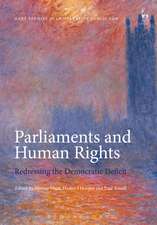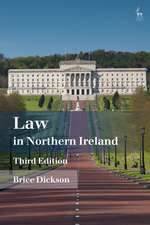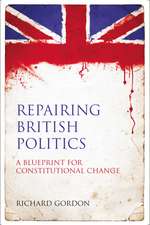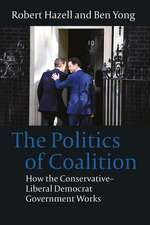Constitutional Rights and Constitutional Design: Moral and Empirical Reasoning in Judicial Review
Autor Paul Yowellen Limba Engleză Hardback – 25 apr 2018
| Toate formatele și edițiile | Preț | Express |
|---|---|---|
| Paperback (1) | 235.83 lei 6-8 săpt. | |
| Bloomsbury Publishing – 2 sep 2020 | 235.83 lei 6-8 săpt. | |
| Hardback (1) | 509.12 lei 6-8 săpt. | |
| Bloomsbury Publishing – 25 apr 2018 | 509.12 lei 6-8 săpt. |
Preț: 509.12 lei
Preț vechi: 730.43 lei
-30% Nou
Puncte Express: 764
Preț estimativ în valută:
97.42€ • 101.99$ • 80.61£
97.42€ • 101.99$ • 80.61£
Carte tipărită la comandă
Livrare economică 05-19 aprilie
Preluare comenzi: 021 569.72.76
Specificații
ISBN-13: 9781509913596
ISBN-10: 1509913599
Pagini: 186
Dimensiuni: 156 x 234 x 20 mm
Greutate: 0.43 kg
Editura: Bloomsbury Publishing
Colecția Hart Publishing
Locul publicării:London, United Kingdom
ISBN-10: 1509913599
Pagini: 186
Dimensiuni: 156 x 234 x 20 mm
Greutate: 0.43 kg
Editura: Bloomsbury Publishing
Colecția Hart Publishing
Locul publicării:London, United Kingdom
Caracteristici
This monograph offers an original contribution to the debate about the legitimacy of judicial review of legislation, arguing that the courts lack the institutional capacity to undertake the necessary empirical and moral reasoning required.
Notă biografică
Paul Yowell is Associate Professor of Law at the University of Oxford, and Fellow and Tutor in Law at Oriel College, Oxford.
Cuprins
1. Introduction I. Removing the Blindfold II. Scope of the Argument III. Recovering Montesquieu 2. The Adjudication of Constitutional Rights I. Constitutional Rights and Ordinary Legal Rights II. Proportionality in Practice III. Proportionality in the US? IV. Absolute and Prima Facie Rights V. Rights, Proportionality and Utilitarianism VI. Rights as Interests VII. Moral and Empirical Reasoning VIII. Other Adjudicative Methods IX. Conclusion 3. Are Rights Trumps? I. The Shielded-Interest Theory II. The Filtered-Preference Theory III. Constitutional Rights and Statistics IV. Revision of the Filtered-Preference Theory 4. Judicial Capacity and Empirical Research I. Empirical Research and the Origins of Proportionality II. Empirical Evidence in the US Supreme CourtIII. Adjudicative Facts and Legislative Facts IV. Finding Legislative Facts V. The Courts and Social Science VI. Case Studies VII. Conclusion 5. Comparative Analysis of Institutional Capacities I. The Basic Structure of Judicial Reasoning II. The Basic Structure of Legislative Reasoning III. Capacity for Empirical Reasoning IV. Capacity for Moral Reasoning V. The Tyranny of the Majority? VI. Capacity to Protect Minorities VII. An Historical Perspective VIII. Conclusion 6. The Problem of Entrenchment I. Legal Change and the Rule of Law II. Rawls and the Perpetual Constitution III. The Rarity of Constitutional Amendment IV. The Legislative-Judicial Method of Reversing NullificationDecisions V. Conclusion 7. Judicial Review and Constitutional Design I. The American and Kelsenian Models II. Designing a Constitutional Court III. Council of Revision IV. Does the Legislature Need a Check? V. Deference VI. Conclusion










